ELECTIONS MATTER
Jim had no idea how important his contract was until his son was born. Collective bargaining changes lives and the most important thing a union member can do is vote for candidates who support not only UAW members, but all workers.
Jim Gregory (Region 1D, Local 598)
Jerry lays it out. Why DO political groups want to keep wages low and unions out? If working families can make more money, why do some political groups want to keep them poor?
Jerry Hodge (Region 8, Local 3520)
Why does Jamie care about the elections? Because she has kids!
Jamie Teller (Region 2B, Local 2209)
To elect candidates who care about workers, his local is starting by getting members engaged through their Union 201 program. “It’s about our best interest as autoworkers and blue collar working class Americans that we elect people with our interest at heart and not the corporate machine.”
Brian Hartman (Region 2B, Local 2209)
In 1937, 10 striking steelworkers were killed, some shot in the back by police, and 90 others wounded in what has come to be known as the Memorial Day Massacre. Amazingly, a film crew caught the event, but the film was suppressed for years for fear of public outrage. The politicians and press of the day were aligned with Republic Steel, and it was later proven that the police were essentially a security force equipped and cared for by Republic Steel. With politicians, press and police aligned against workers, public opinion was firmly against them. “As long as we have laws that govern the relationship between the employer and the members of the union, we must constantly be on the alert to protect those rights. The right of freedom of speech, freedom of assembly, the right to peacefully picket.” Check out the Illinois Labor History Society for pictures of this year’s event remembering the massacre.
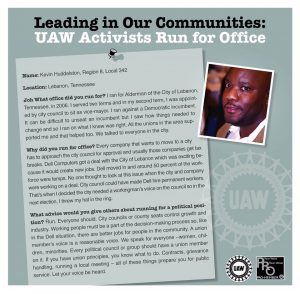
Kevin decided it was time to put the workingman’s voice on city council after councilmembers overlooked an important detail when a new company moved to town.
Kevin Huddleston (Region 8, Local 342)
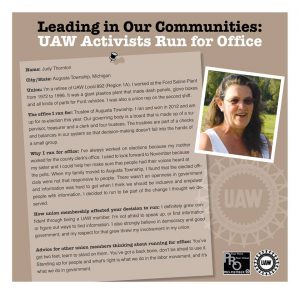
UAW activists are not only active behind the scenes in politics, but many end up running for office themselves. We’re starting a series so you can get to know some of them who often credit their union involvement for inspiring them to take that step.
Judy Thornton (Region 1A, Local 892)
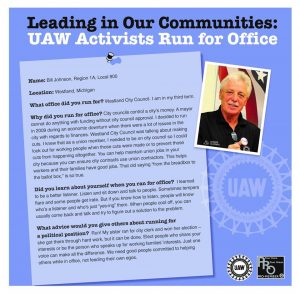
During the economic downturn, Bill Johnson knew his community needed someone on city council looking out for working families. City councils approve a city’s spending and make budget cuts and Bill wanted to make sure that when times were tight, working people weren’t going to bear the brunt of it. So he rose to the occasion and ran. Almost a decade later, ”the ballot box to the breadbox” is still his mantra.
Bill Johnson (Region 1A, Local 900)
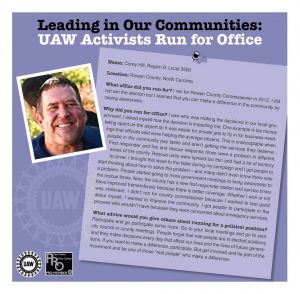
Corey ran for public office but did not win the election. But he learned that win or lose, if you want to make changes in your community, you have to participate in local politics.
Corey Hill (Region 8, Local 3520)
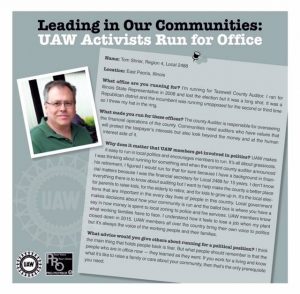
UAW members know what working families have to face. If you care about your community, it’s the only prerequisite you need to run for office.
Tom Shrier (Region 4, Local 2488)
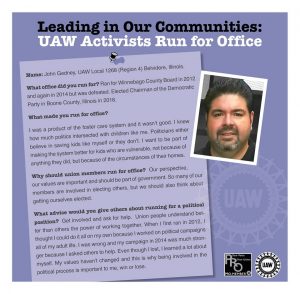
John grew up in the foster system. As an adult, he wanted to make a difference. Win or lose, he is out there trying to improve the lives of the most vulnerable in our society.
John Gednew (Region 4, Local 1268)
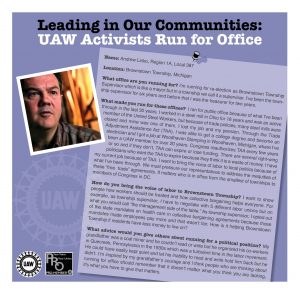
When his steel mill closed down, Andrew Linko took advantage of the Trade Adjustment Act’s retraining program and got hired at Woodhaven Stampin and continued his union activism. His inspiration to run for public office came from his grandfather who organized his co-workers in the coal mines of Pennsylvania in the 1930s.
Andrew Linko (Region 1A, Local 387)
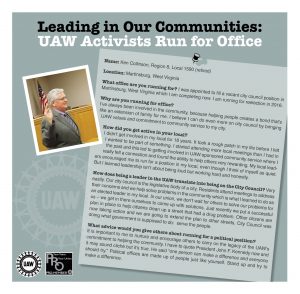
As a city council member, Ken is helping do what government is supposed to do: serve the people.
Ken Collinson (Region 8, Local 1590)
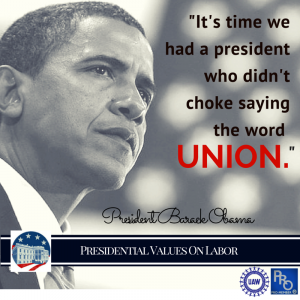
President Barack Obama never shied away from talking about the power of collective bargaining. Besides being in the history books for being the first African-American president, he also was critical in helping guide the U.S. auto industry back to life.
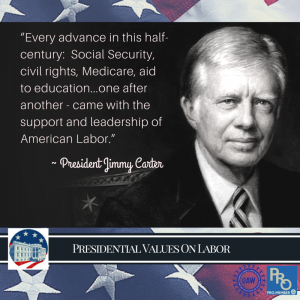
President Jimmy Carter is a humanitarian, and his deeply held religious beliefs led him to introduce changes in the way the U.S. conducted foreign policy during his administration. His continued commitment to human rights after his presidency won him the Nobel Peace Prize in 2002. He has been called the most effective ex-president in American history.
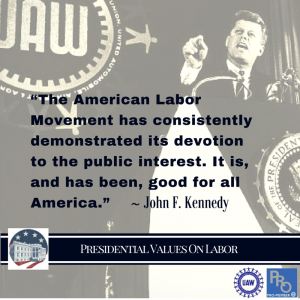
President John F. Kennedy is one of the most beloved presidents in our nation’s history. He was only in office for three years but his idealism motivated a generation to fight for justice and positive social change.
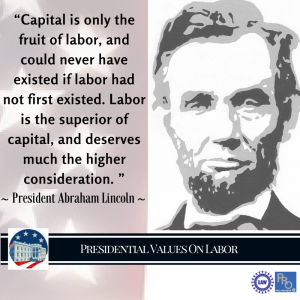
When President Lincoln made his first address to Congress at the start of the Civil War in 1861, he made a profound statement about capital and wealth. Lincoln noted that it was the labor of slaves and workers which created most of that wealth enjoyed by a privileged few.
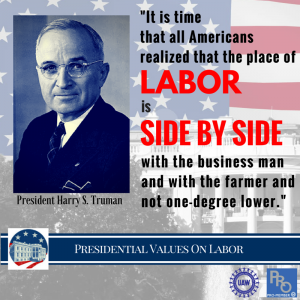
President Harry S. Truman became president in 1945 after President Roosevelt died in office. His presidency faced many problems in the years immediately following World War II as the country struggled to transition to a peacetime economy. Truman tried to adhere to the ideals of the New Deal and advocated for national health insurance and proposed a federal civil rights program. Unfortunately, he was met with Republican resistance. When he vetoed the Taft-Hartley Act because he thought the law was unfair to labor unions, the Republican Congress overrode his veto and the anti-union legislation became law in 1947. He ran for president in 1948 despite being told he was incapable of winning due to Southern Dixiecrats opposing his civil rights platform. He won despite the bigotry that permeated the politics of the time.
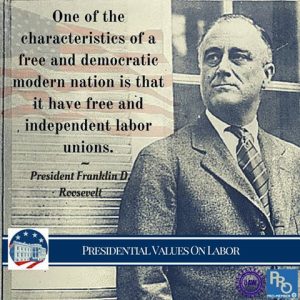
FDR’s New Deal reforms gave workers the right to bargain under the Wagner Act of 1935. But what the New Deal is mostly known for is providing a minimum safety net for all. Republicans and corporate interests bitterly opposed the New Deal and called FDR a socialist who was taking the country in the wrong direction. Sound familiar?
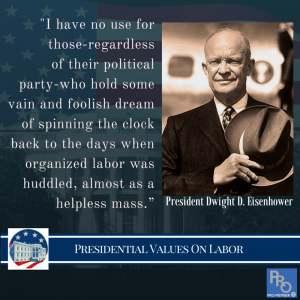
President Dwight D. Eisenhower was in office from 1953 to 1961. He ran as a Republican and at that time the Republican Party platform called for expansion of Social Security, broadened unemployment insurance, better health care, a higher minimum wage, improved job safety for workers, and equal pay. Eisenhower would be drowned out by the loud and extreme voices of the GOP if he were to run as a Republican in 2016.
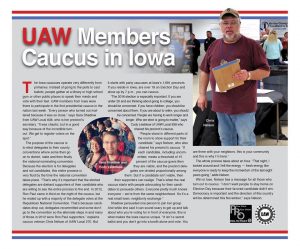
Three UAW members share their stories about working the Iowa caucuses, a night that kicks off the presidential race for many of us It’s a night of community activism, discussion with neighbors and voting with your feet.
(Region 4, Local 838)
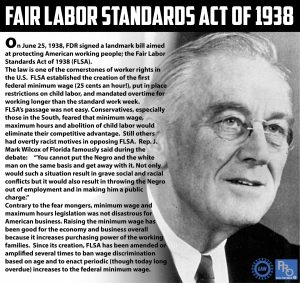
On June 25, 1938, FDR passed the Fair Labor Standards Act which led to the minimum wage, overtime pay and protections for child labor.
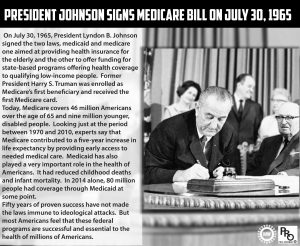
On July 30, 1965, President Johnson signed into law Medicare and Medicaid, providing health care to low-income and elderly people.
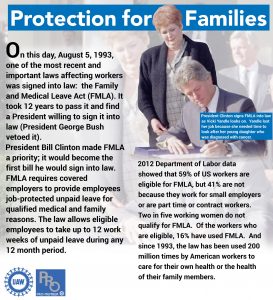
On August 5, 1997, the Family Medical Leave Act became law allowing workers to take leave for family members who are sick.

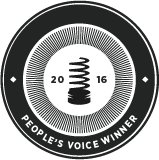
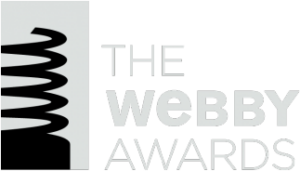
UAW Statement on New York Mayoral Primary Race
UAW President Shawn Fain on NYC Mayor’s Race: “We don’t need another hack politician like Cuomo”
UAW Hails Decision of Federal Judge to Restore Terminated NIH Grants